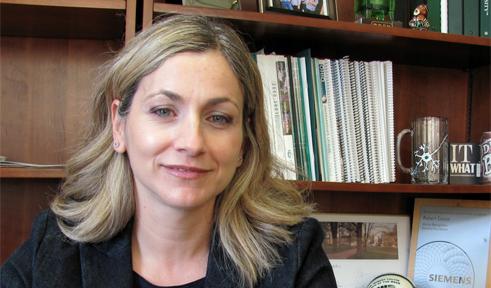Maria Chatzidaki-Livanis

Education
Ph.D., University of Florida, 2004
Academic Positions
2009 – 2018 Instructor in Medicine. Harvard Medical School.
2006 – 2009 Postdoctoral Research Associate. Harvard Medical School.
2004 – 2006 Postdoctoral Research Associate. University of Florida.
Research Interests
Bacteroides are one of the numerically dominant genera of bacteria of the human intestinal microbiota. In this ecosystem, these species are mutualistic symbionts, providing beneficial properties to humans. Outside of the natural colonic niche, Bacteroides fragilis is an opportunistic pathogen and is the leading cause of anaerobic bacteremia and intraabdominal abscesses. B. fragilis has unique characteristics that are instrumental in the ability of this organism to provide both symbiotic benefits in the intestine and to cause disease if the bacterium gains access to extra-intestinal sites. The objective of my research is to understand the molecular mechanisms governing the complex regulation of these characteristics.
Selected Publications
McEneany, V.L., Coyne, M.J., Chatzidaki-Livanis, M., Comstock, L.E. Acquisition of MACPF domain-encoding genes is the main contributor to LPS glycan diversity in gut Bacteroides species. ISME J. 2018.
Chatzidaki-Livanis, M., Coyne, M.J., Roelofs, K.G., Gentyala, R.R., Caldwell, J.M., and Comstock, L.E., The gut symbiont Bacteroides fragilis secretes a eukaryotic-like ubiquitin protein that mediates intra-species killing. MBio. 2017; 8(6).
Roelofs, K.G., Coyne, M.J., Gentyala, R.R., Chatzidaki-Livanis, M., and Comstock, L.E. Bacteroidales secreted antimicrobial proteins target surface molecules necessary for gut colonization and mediate competition in vivo. MBio. 2016; 7(4).
Chatzidaki-Livanis, M., Geva-Zatorsky, N., and Comstock, L.E., Bacteroides fragilis type VI secretion systems use novel effector and immunity proteins to antagonize human gut Bacteroidales species. Proc. Natl. Acad. Sci. U S A. 2016; 113(13):3627-32.
Chatzidaki-Livanis, M. and Comstock, L.E., Friend turned foe: a role for bacterial sulfatases in colitis. Cell Host Microbe. 2015; 17(5):540-1.
Chatzidaki-Livanis, M., Coyne, M.J., and Comstock, L.E., An antimicrobial protein of the gut symbiont Bacteroides fragilis with a MACPF domain of host immune proteins. Mol. Microbiol. 2014; 94(6)1361-74.
Coyne, M.J., Fletcher, C.M., Chatzidaki-Livanis, M., Posch, G., Schaffer, C., and Comstock, L.E. Phylum-wide general protein O-glycosylation in the Bacteroidetes. Mol. Microbiol. 2013; 88(4)772-83.
Chatzidaki-Livanis, M., Weinacht, K.G., and Comstock, L.E. Trans locus inhibitors limit concomitant polysaccharide synthesis in the human gut symbiont Bacteroides fragilis. Proc. Natl. Acad. Sci. U S A. 2010; 107(26):11976-80.
Fletcher, C.M., Coyne, M.J., Villa, O.F., Chatzidaki-Livanis, M., and Comstock, L.E. A general O-glycosylation system important to the physiology of a major human intestinal symbiont. Cell. 2009; 137:321-331.
Coyne, M.J., Chatzidaki-Livanis, M., Paoletti, L., and Comstock, L.E. Role of glycan synthesis in colonization of the mammalian gut by a bacterial symbiont. Proc. Natl Acad Sci 2008; 105(35):13099-13104.